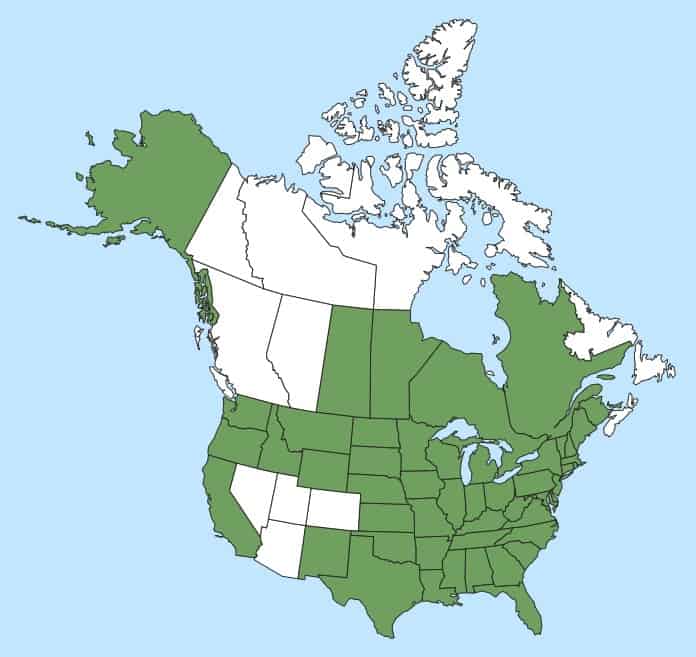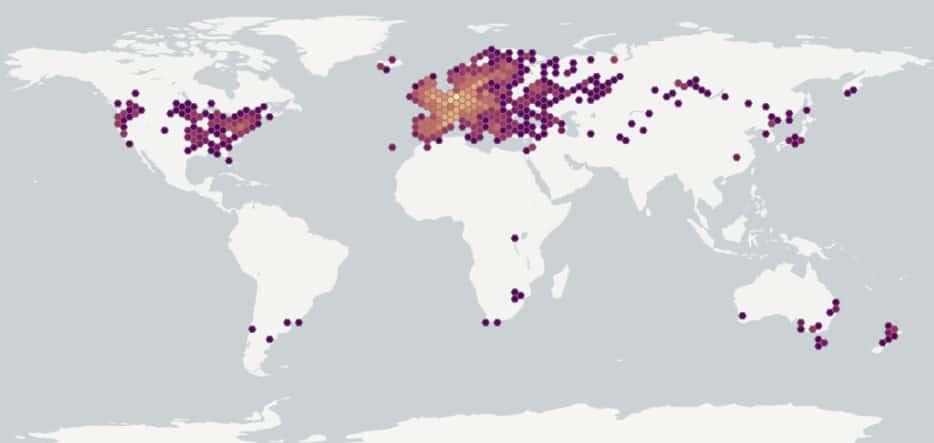Agrostemma githago
Explore More :
Explore plus :
Overview
Aperçu
Regulation :
Remarques Réglementation:
- Quarantine lists of countries e.g. Mexico *may be updated without notice
Regulation Notes:
On quarantine lists of countries e.g. Mexico*.
*Quarantine lists of countries may be updated without notice.
Distribution :
Répartition :
This species is native to northern Africa and Eurasia. It was introduced in South Africa, Australia and North and South America. Widespread in the United States (USDA-ARS 2017).
Habitat and Crop Association :
Habitat et Cultures Associées :
Purple cockle occurs in cultivated fields, roadsides and disturbed areas (Darbyshire 2003).
Economic Use, cultivation area, and Weed Association :
Utilisation économique, zone de culture et association de mauvaises herbes :
Duration of Life Cycle :
Durée du cycle vital:
Annual or biennial
Dispersal Unit Type :
Type d’unité de dispersion :
Seed
General Information
RENSEIGNEMENTS GÉNÉRAUX
In the past, this species was a common weed of cultivated fields such as winter wheat and fall rye, but its prevalence has declined markedly as a result of mechanical seed cleaning and the use of herbicides (Kingsbury 1964, eFloras 2017). Now it is found mostly along roadsides and sometimes as a cultivated plant in flower gardens. Its seeds are highly toxic (Kingsbury 1964).
.Identification
Identification
-
Seed
Size
- Seed length: 2.9 – 3.7 mm (average: 3.3 mm); width: 2.0 – 3.4 mm (average: 2.9 mm); thickness: 1.8 – 2.8 mm (average: 2.2 mm)
Shape
- Seed is an inflated D-shape or wedge-shaped with compressed sides
- The outline of the curved embryo is evident as a swelling around the outside of the seed
Surface Texture
- Seed surface is densely covered in parallel rows of pointed tubercles
Colour
- Seeds are dull, dark brown or black; immature seeds are dark red
Other Features
- Hilum is an open hole with white tissue along the edge of the seed
- Capsules are egg-shaped with 10 longitudinal ridges

Purple cockle (Agrostemma githago) seeds

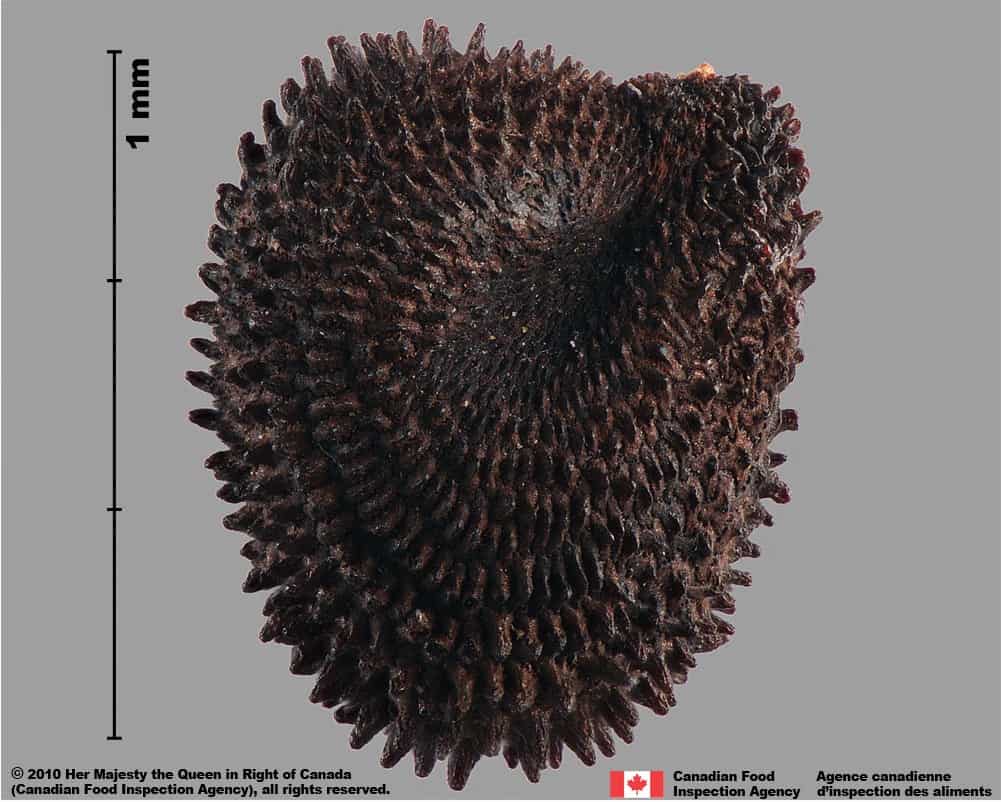
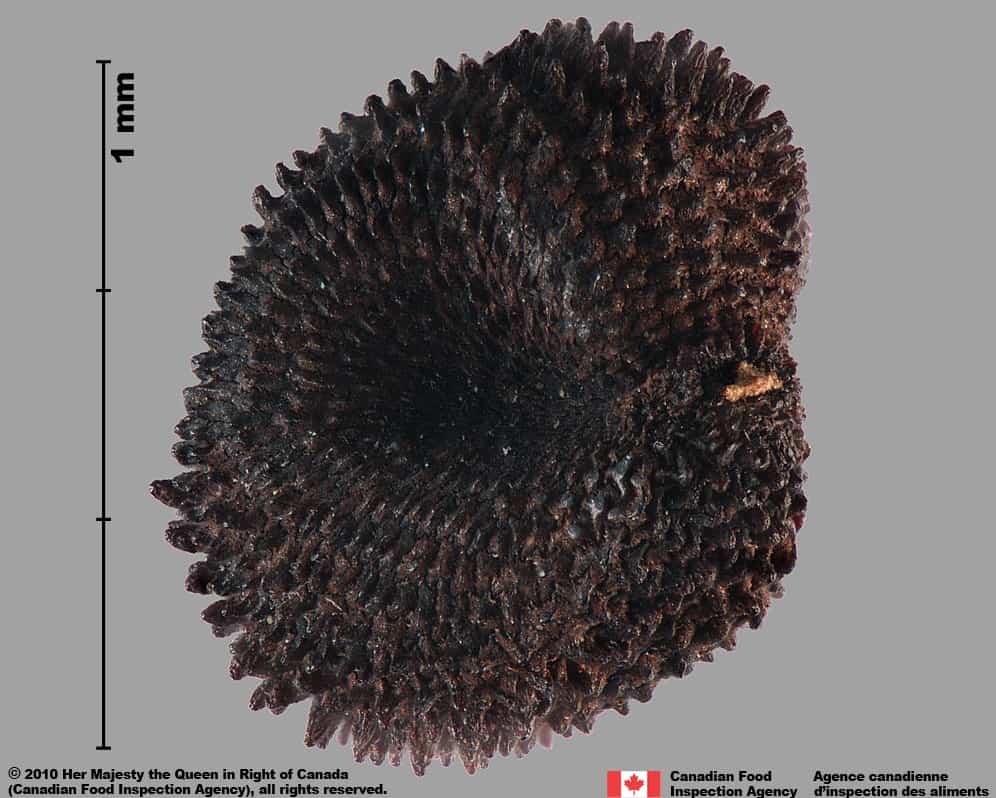

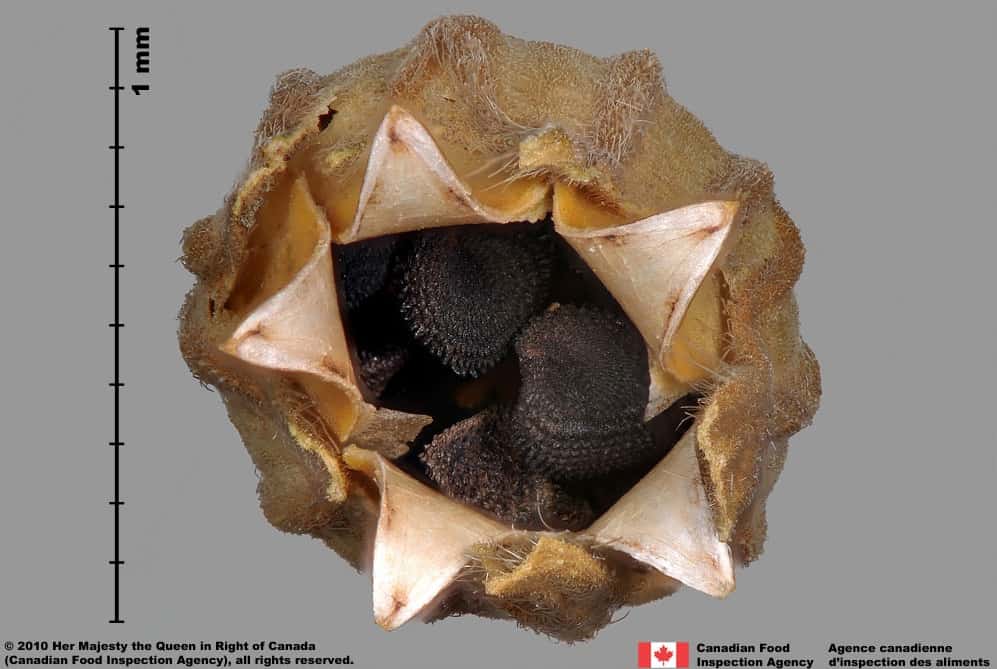
Identification Tips
CONSEILS POUR L’IDENTIFICATION
Additional Botany Information
AUTRES RENSEIGNEMENTS BOTANIQUES
Similar Species
ESPÈCES SEMBLABLES
Similar species are based on a study of seed morphology of various species, and those with similar dispersal units are identified. The study is limited by physical specimen and literature availability at the time of examination, and possibly impacted by the subjectivity of the authors based on their knowledge and experience. Providing similar species information for seed identification is to make users aware of similarities that could possibly result in misidentification.
Gypsophila vaccaria (cow cockle)
Gypsophila vaccaria seeds are a similar inflated shape, with tubercles, an open hole hilum and dark colour.
Gypsophila vaccaria seeds are generally smaller than purple cockle (average length: 2.0 mm; average width: 1.9 mm) and the sides are not compressed. They are dark red to black colour with rounded surface tubercles. Capsules are egg-shaped with 4-5 longitudinal ribs that are thicker than the ridges on purple cockle capsules.
Click to select species
Cliquez pour sélectionner les espèces
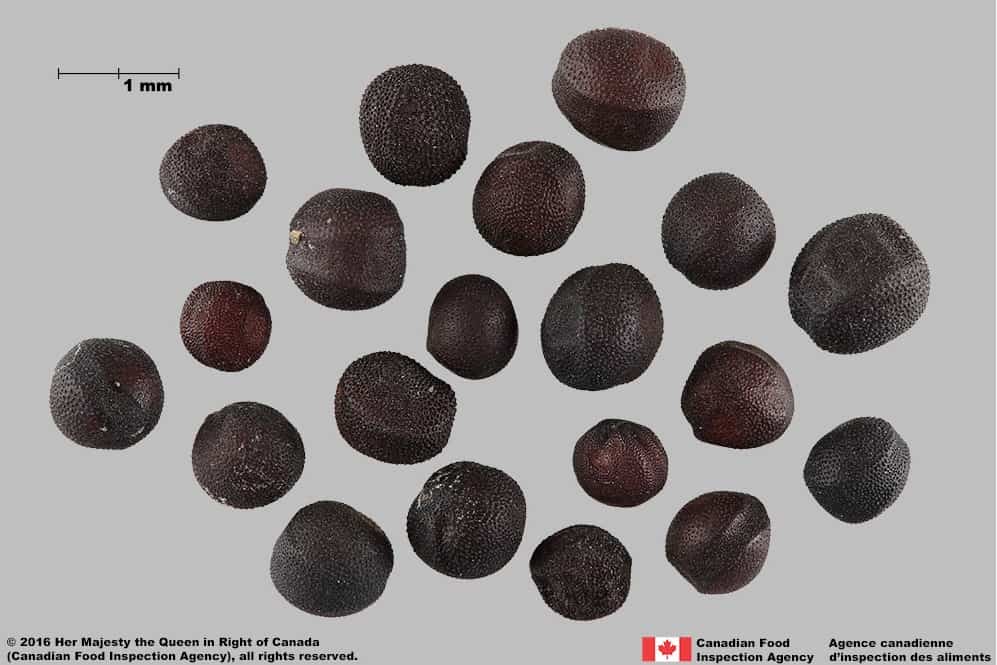
Gypsophila vaccaria
Comparison Window
Fenêtre de comparaison
MAIN SPECIES
ESPÈCES PRINCIPALES
Agrostemma githago

Agrostemma githago
Caryophyllaceae
Purple cockle (Agrostemma githago) seeds
MAIN SPECIES
ESPÈCES PRINCIPALES
Agrostemma githago

Agrostemma githago
Caryophyllaceae
Purple cockle (Agrostemma githago) seed
MAIN SPECIES
ESPÈCES PRINCIPALES
Agrostemma githago

Agrostemma githago
Caryophyllaceae
Purple cockle (Agrostemma githago) seed
MAIN SPECIES
ESPÈCES PRINCIPALES
Agrostemma githago

Agrostemma githago
Caryophyllaceae
Purple cockle (Agrostemma githago) seeds and capsule
MAIN SPECIES
ESPÈCES PRINCIPALES
Agrostemma githago

Agrostemma githago
Caryophyllaceae
Purple cockle (Agrostemma githago) capsule; top-down view
SIMILAR SPECIES
ESPÈCES SEMBLABLES
Gypsophila vaccaria

Gypsophila vaccaria
Caryophyllaceae
Gypsophila vaccaria (cow cockle) seeds
SIMILAR SPECIES
ESPÈCES SEMBLABLES
Gypsophila vaccaria
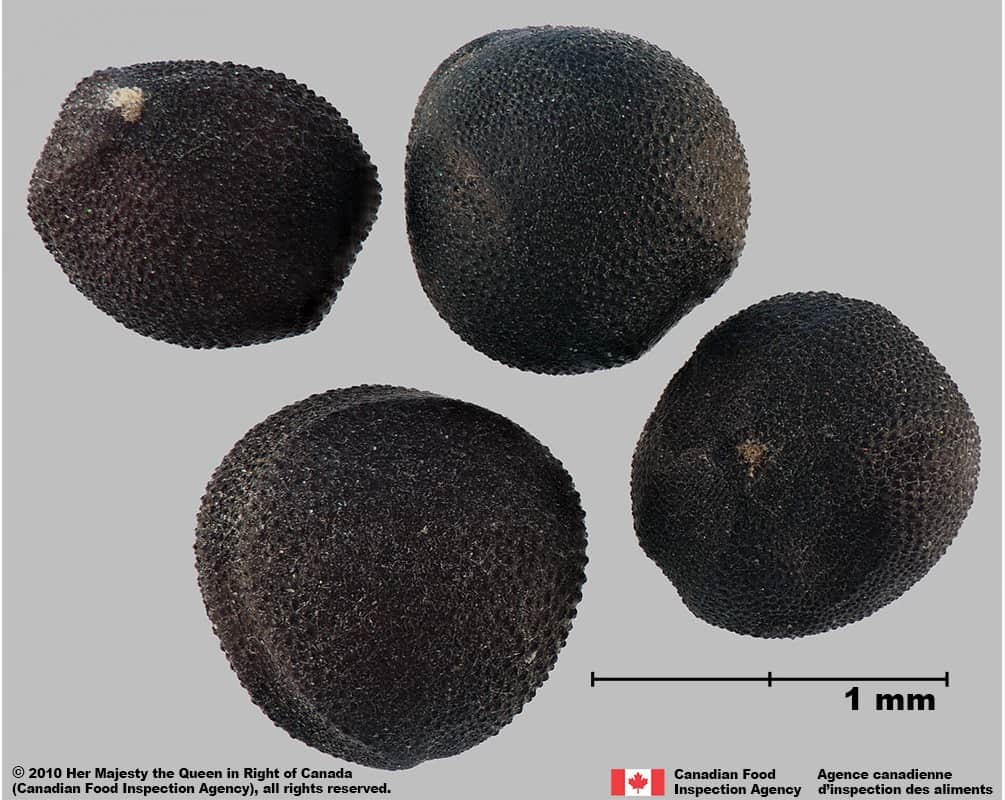
Gypsophila vaccaria
Caryophyllaceae
Gypsophila vaccaria (cow cockle) seeds
SIMILAR SPECIES
ESPÈCES SEMBLABLES
Gypsophila vaccaria
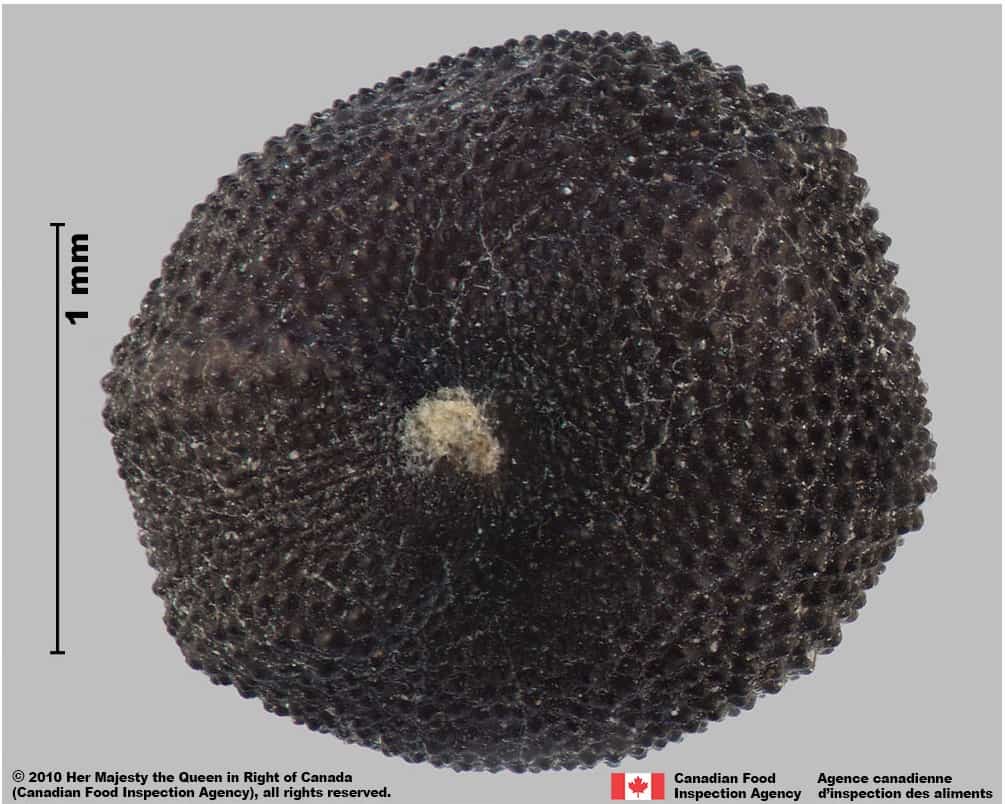
Gypsophila vaccaria
Caryophyllaceae
Gypsophila vaccaria (cow cockle) seed, hilum view
SIMILAR SPECIES
ESPÈCES SEMBLABLES
Gypsophila vaccaria
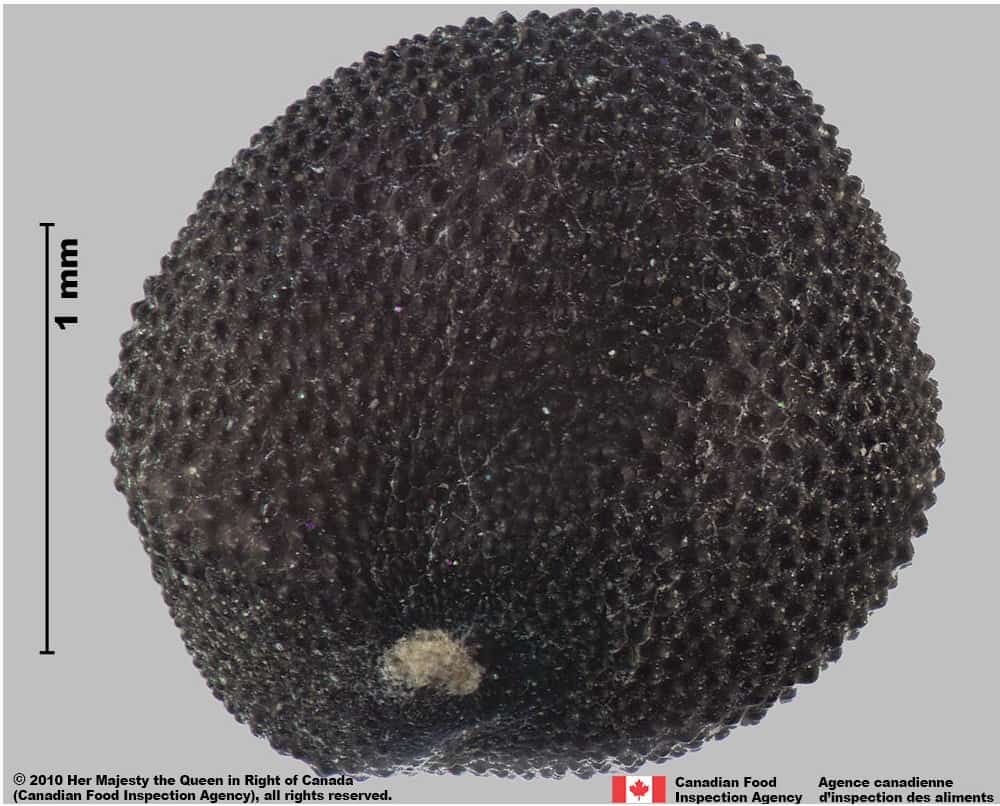
Gypsophila vaccaria
Caryophyllaceae
Gypsophila vaccaria (cow cockle) seed, hilum view
Need ID Help?
Besoin d’aide pour l’identification?
Reference(s)
Référence(s)
Darbyshire, S. J. 2003. Inventory of Canadian Agricultural Weeds. Agriculture and Agri-Food Canada, Research Branch. Ottawa, ON.
eFloras. 2017. Electronic Floras. Missouri Botanical Garden, St. Louis, MO & Harvard University Herbaria, Cambridge, MA., http://www.efloras.org Accessed August 25, 2017.
Flora of North America (FNA) Editorial Committee, eds. 1993+. Flora of North America North of Mexico [Online]. 22+ vols. New York and Oxford. Accessed December 29, 2022.
Global Biodiversity Information Facility (GBIF) Secretariat. 2022. https://doi.org/10.15468/39omei Accessed via https://www.gbif.org/species/3085368 Accessed December 29, 2022.
Kingsbury, J. M. 1964. Poisonous Plants of the United States and Canada. Prentice-Hall, Inc., Englewood Cliffs, NJ.
U.S. Department of Agriculture-Agricultural Research Services (USDA-ARS). 2017. Germplasm Resources Information Network (GRIN), https://npgsweb.ars-grin.gov/gringlobal/taxon/taxonomysearch Accessed April 25, 2017.



